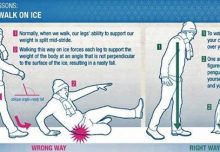 If dementia were a foot race Alzheimer’s would be number one, but the first place finisher of this race might not even be able to see the runner-up on the track to the rear. The Alzheimer’s Association estimates that there are about 5.8 million Americans of all ages currently living with the second place condition. Lewy Body dementia, considered to be number two in prevalence in America, totals only 1.3 million people, to date, but researchers at the Mayo Clinic suggest that this number may be a profound underestimate because of the nature of the disease.
If dementia were a foot race Alzheimer’s would be number one, but the first place finisher of this race might not even be able to see the runner-up on the track to the rear. The Alzheimer’s Association estimates that there are about 5.8 million Americans of all ages currently living with the second place condition. Lewy Body dementia, considered to be number two in prevalence in America, totals only 1.3 million people, to date, but researchers at the Mayo Clinic suggest that this number may be a profound underestimate because of the nature of the disease.
The “Lewy Bodies” which are the hallmark of the disease of the same name accumulate in the neurons of the brain and affect both cognition and movement. As a result, it often is misdiagnosed as Parkinson’s disease. And the cognitive part of the decline often confuses it with Alzheimer’s disease or even vascular dementia. To make it more confusing, Parkinson’s disease has its own dementia manifestation.
So, what does one look for that can be a clue that a loved one may have the onset of Lewy Body Dementia? First, this is a diagnosis for a neuro-psychologist, not a family member, but be aware of changes like the following so that your loved one who may have the second place dementia can get the best help as early as possible:
- Hallucinations may be one of the early signs, and note that hallucinations can be more than just visual…like hearing what is not there or even smelling what is not present.
- Movement issues that can be like Parkinson’s like rigid muscles or tremors, shuffled walking, etc.
- Autonomic changes that can cause dizziness or falls and curiously digestive changes like constipation with no changes in diet.
- Confusion and memory loss also come along with the package and account for some of the difficulty in distinguishing this condition from other dementias.
- Difficulty with sleep such as intense dreams with associated physical movement or just plain drowsiness throughout the day.
- Mood changes that show a clear downward trajectory like depression or apathy or even more aggressive behavior.
If you’re thinking that all of these symptoms look like other dementias or like Parkinson’s, then you can appreciate why Lewy Body Dementia can be misdiagnosed. So, it may be number two, but it may be a lot closer to the first place in this category than we know.
Charlotte Bishop is an Aging Life Care Advisor, Geriatric Care Manager and founder of Creative Care Management, certified professionals who are geriatric advocates, resources, counselors and friends to older adults and their families in metropolitan Chicago. She also is the co-author of How Do I Know You? A Caregiver’s Lifesaver for Dealing with Dementia.






